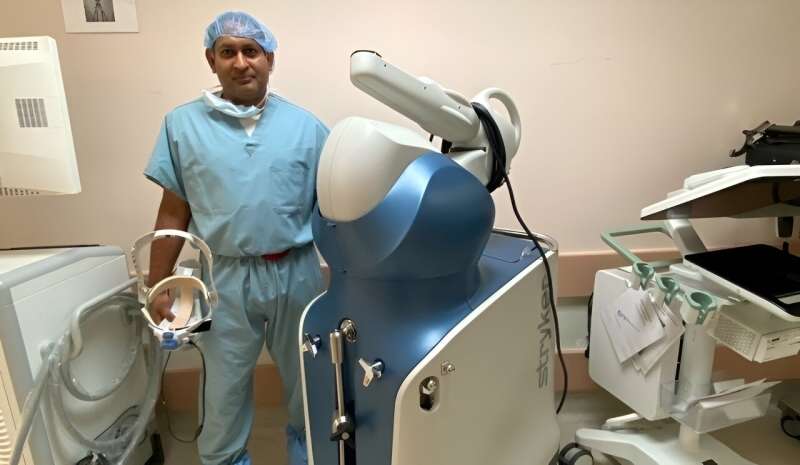This article has been reviewed according to Science X's editorial process and policies. Editors have highlighted the following attributes while ensuring the content's credibility:
fact-checked
trusted source
proofread
Robotic total knee replacement improves outcomes but costs more, finds study

Total knee replacements performed with the help of a surgical robot have better outcomes on average than similar surgeries performed manually but can cost significantly more, a new study by UT Southwestern Medical Center researchers shows. The findings, published in Archives of Orthopaedic and Trauma Surgery, could help doctors and patients make more educated decisions on which option is best for each circumstance.
"As the population continues to age, there will be a greater demand for safe and effective total knee replacement surgery, also known as total knee arthroscopy. This study advances the field by outlining differences between these two procedures," said study leader Senthil Sambandam, M.D., Assistant Professor of Orthopaedic Surgery at UT Southwestern.
Total knee arthroplasty (TKA), in which the weight-bearing portions of the knee are completely replaced with prosthetic components, has become increasingly common over the past several decades to treat knee degeneration and relieve pain and disability. Most TKAs are conventional, meaning that surgeons perform them by hand, judging how much bone to remove based on their training and expertise.
A growing number of these surgeries are performed using surgical robots that rely on preoperative imaging or finding anatomical landmarks during surgery to determine where to cut. Using the robot theoretically improves accuracy and safety over conventional techniques; however, some studies have suggested that these improvements are minimal or nonexistent in practice and may not justify the higher cost.
To accurately compare the two approaches, Dr. Sambandam and his colleagues gathered data from the National Inpatient Sample, a publicly available database that contains information from about 7 million hospital stays each year from across the country.
Using diagnostic codes, the researchers identified 541,122 patients who received conventional TKAs and 17,249 who received robotic TKAs between 2016 and 2019. They also collected information related to these procedures, such as the length of hospital stays, complications, costs, and patients' demographic information.
Comparing the data, researchers found that patients who underwent robotic TKA had hospital stays that were nearly a half day shorter. They were also significantly less likely to have a host of complications such as infections, excessive blood loss, fractures, dislocations, or mechanical complications of their prosthetic. However, the robotic TKAs cost an average of about $2,400 more than conventional TKAs.
Most of these findings held true when the researchers made comparisons based on factors such as age, sex, race, tobacco use, diabetes, and obesity. However, in this analysis, the cost of robotic TKA was as much as $15,000 more in some comparisons.
The researchers noted that the higher cost of robotic TKA comes from the increased expense of disposable equipment necessary to perform the procedure and the acquisition of robotic equipment, which typically costs millions of dollars.
However, Dr. Sambandam said robotic TKA may be a more cost-effective option in high-volume hospitals, where savings from reduced complications can help offset the higher costs. Together, he said, the results from this study can help doctors and patients discuss the pros and cons of both procedures and decide which option is best for each patient.
More information: Vikram A Aggarwal et al, Outcomes following robotic assisted total knee arthroplasty compared to conventional total knee arthroplasty, Archives of Orthopaedic and Trauma Surgery (2024). DOI: 10.1007/s00402-024-05231-7




















